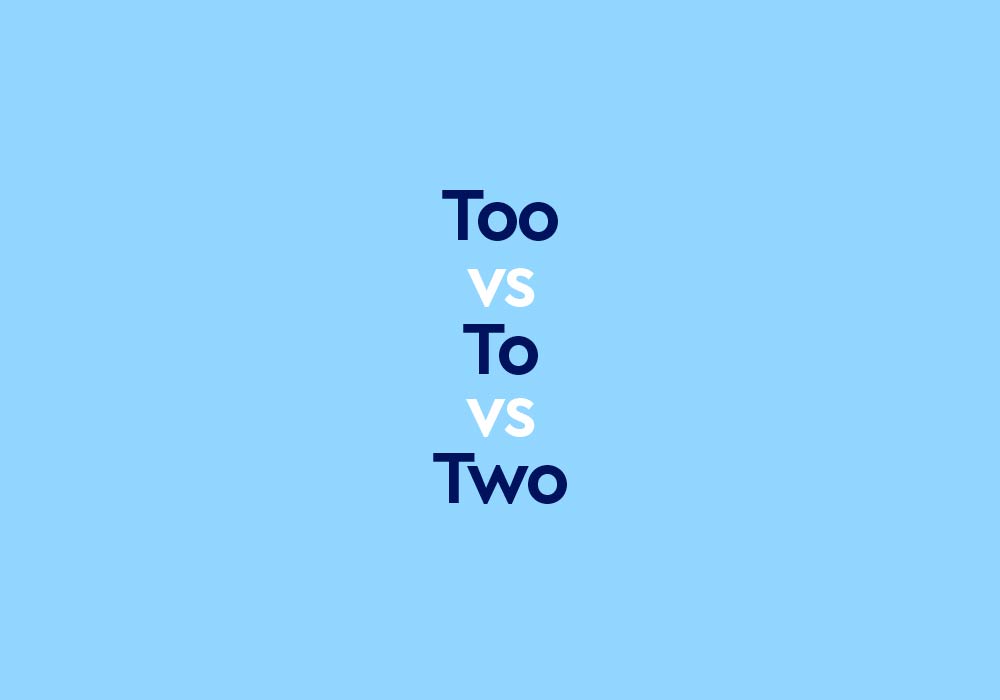To is used to indicate movement, purpose, and relationships. Too signifies excessive quantity or additional inclusion.
To and too might appear interchangeable due to their shared letters and phonetic resemblance. They are both short words that are frequently used in various contexts. However, the distinction between these words lies in their meanings and usage.
When is to used?
To serves various grammatical functions, often functioning as a preposition, infinitive marker, or adverb. It indicates direction, purpose, or a relationship between elements.
Example sentences
Preposition
He went to the store.
In this sentence, to is used as a preposition to indicate the destination or direction of the action. It shows that the subject (he) went in the direction of the store. To is often used as a preposition to connect a verb (in this case, "went") with its object (in this case, "the store") and provide information about where the action is directed.
Infinitive marker
She decided to study abroad.
In this sentence, to is used as an infinitive marker. The infinitive form of a verb typically includes to before the base form of the verb (in this case, "study"). In this context, the infinitive "to study" indicates the purpose or intention of the subject (She). It shows that her decision is related to the action of studying abroad. To is commonly used in this way to express an action or purpose.
Adverb
She arrived early to help set up the event.
In this sentence, "to" is used as an adverb to modify the verb "arrived." It provides additional information about the timing of the action. Specifically, it tells us that she arrived early, indicating the time at which the action (her arrival) occurred. While "to" is more commonly used as a preposition or infinitive marker, it can occasionally function as an adverb to convey timing or manner in a sentence like this.
When is too used?
Too functions as an adverb, conveying the idea of excess or addition. It frequently modifies adjectives or adverbs to emphasize an excessive or abundant quality.
Example sentences
- She wanted to go to the party too, but she had to work late.
More example sentences
- She walked to the park to enjoy the sunshine.
- The coffee was too hot to drink immediately.
- He decided to travel to Europe for his summer vacation.
- Sarah is going to the library to borrow some books.
- The movie was entertaining, and the popcorn was delicious too.
- Are you coming to the party too?
- The package was addressed to my friend's house.
- The bag was too heavy for me to lift on my own.
- She is going to the gym every morning to work out.
- The music was too loud for me to concentrate on my work.
Practice questions
- I'm going to/too the store to/too buy some groceries.
- Sarah wants to/too join the soccer team.
- The movie was too/to long for my liking.
- Can you pass me the salt? This soup is a bit bland too/to.
- She studied hard and managed to get to/too the top of her class.
- I'd love to/too visit Paris someday.
- The cake was too/to sweet, so I couldn't finish my slice.
- He stayed up too/to late last night and now he's tired.
- Are you coming to/too the party too/to?
- The concert tickets were too/to expensive for us to afford.
- She wanted coffee, and I did too/to.
- The weather was perfect, so we decided to/too go for a hike.
- The cat was too/to frightened to come out from under the bed.
- Can you pass this message to/too your sister?
- I am too/to excited about the upcoming trip.
If you still are unsure about which to use, try out Engram where you can submit your English sentences to get immediate feedback and suggestions based on how native English speakers write.

Answer Key:
- to / to
- to
- too
- too
- to
- to
- too
- too
- to / too
- too
- too
- to
- too
- to
- too
Reference:














